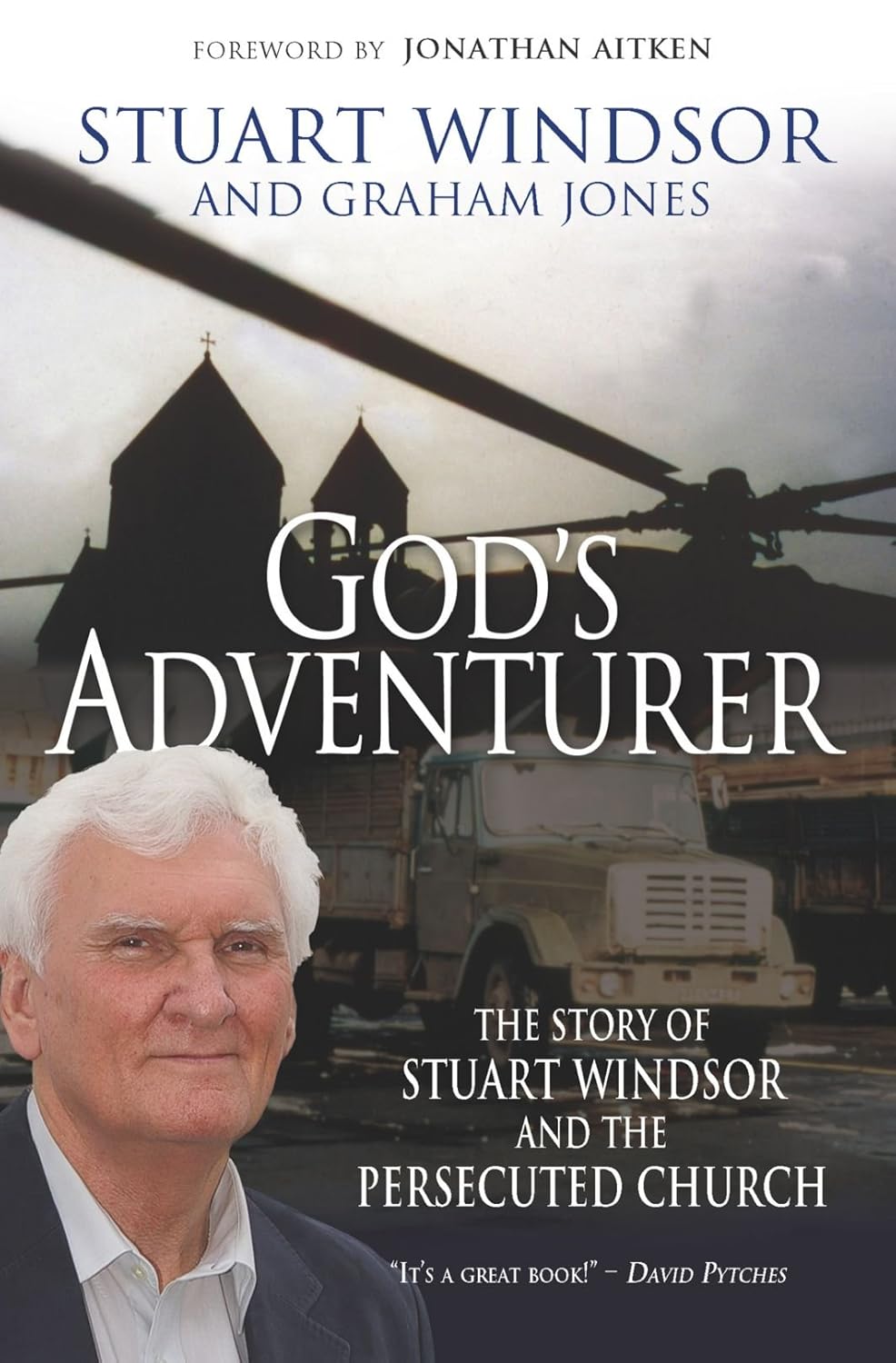I first met Stuart Windsor many years ago at a Christian Solidarity Worldwide (CSW) event at which Baroness Caroline Cox was telling a profoundly moved Perth audience about her recent stay with the persecuted Christian communities of Nagorno Karabakh. Stuart was quietly manning the bookstall and information stand and signing people up to receive CSW’s regular news and prayer letter. I remember speaking very briefly to him. I met him again recently –he was speaking at a church near us, again about the plight of people persecuted for their faith, and this time I was able to speak to him at greater length. What I hadn’t realised when I met him, was that this genial and ebullient man somewhat self-effacingly hides a remarkable personal history. While when I met him he was running a bookstall, his support of the persecuted church has not been restricted to office work and administration, but has taken him all around the world, to war zones, areas of conflict and through situations of great difficulty and extreme danger. Stuart has now worked with the writer Graham Jones to tell this complete story for the first time, and the result is a powerful, and gripping book which demands an urgent response.
This is not a conventional autobiography, in which the subject examines every aspect of his life; but really is about all the events which combined to make caring for the persecuted church his life calling and great passion - and how that has been outworked over the last half-century. The book begins with one of Stuart’s remarkable fact-finding missions and documents a series of amazing answers to prayer; but this is really only a taster of what is to come. It then details Stuart’s tragic early family life and his childhood and adolescence in the care of Barnardo’s Homes followed by his career in the RAF, military intelligence, and then in the Water Board. Marriage and Children then followed – and all of this is pretty standard biographical stuff. What changed Stuart’s life was his conversion to Christianity when in the services, which led to abandoning the hard-drinking lifestyle he had pursued and finding a spiritual home amongst the Pentecostals. Here he began to explore what purpose God might have for his life. Training and ordination followed, but Stuart was never called to pastor a church, and worked in the film unit of the denomination producing videos of conferences and events. It was when he was asked to join a delegation to persecuted Christians, to film their stories, that he discovered his life’s calling; to stand in solidarity with the suffering church.
The book tells the story of how Stuart began to pursue this cause, and how with notable people like Baroness Cox he was able to publicise the fate of forgotten minorities, such as the beleaguered people of the Nagorno Karabakh enclave to the churches in the West for their prayers, and to politicians for their actions. This led in turn to Stuart’s appointment as head of Christian Solidarity Worldwide, from where he has led campaigns for the rights of the oppressed in Nigeria, India, Pakistan, Saudia Arabia, Eritrea, North Korea, and Sudan.
CSW has specialised in producing first-class research from these areas, which has won the respect of governments, aid agencies, and bodies like the UN. Much of this intelligence gathering has been done at enormous personal risk, and the book quite matter-of-factly tells of being shot at in aircraft, being cut-off in blizzards, having car break-downs in the middle of Africa, confronting dictators, and listening to oppressors in order to gain a balanced view of all the conflicts they report on. All through this are countless incidents when human wisdom and resources are exhausted and the CSW teams have turned to prayer and seen surprising answers.
This is not a demanding read in an academic sense, it is fast –paced and written in popular language. Nevertheless is it a book which lives on in the mind even when the final page has been read and the covers closed, it demands a response because the suffering of the church has if anything escalated in the year or two since it was published. The images firmly lodged in my mind as I put the book back on my shelf include Stuart Windsor praying with friends in Africa for spare car parts so that they could get out of the country, of trucks full of aid heading into Nagorno Karabakh, of the government bombers destroying the villages of Southern Sudan, of Iranian Martyrs bravely standing for Christ under the terror of the Islamic revolution, of the fear of Sharia Law in Nigera, and of the courageous and professional work of CSW exposing these hidden crimes, and being the ‘voice for the voiceless’ – standing alongside the forgotten ones.
Stuart has formally retired from his role at CSW, but the fight for justice for the oppressed continues. I am told that Stuart is still hard at work in his 'retirement'. The CSW website contains details of all their current campaigns, details of current world issues in the area of freedom of religion, and many opportunities to join in the work www.csw.org.uk


No comments:
Post a Comment